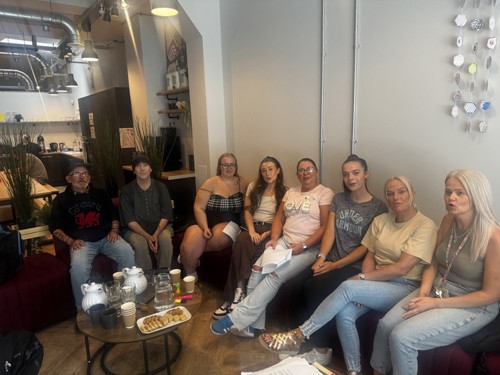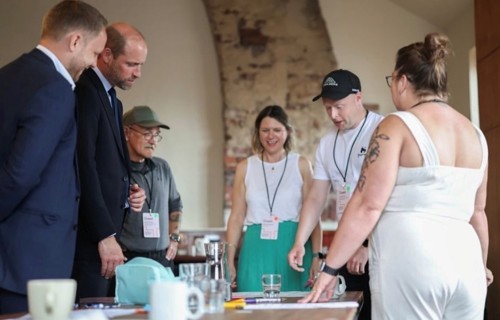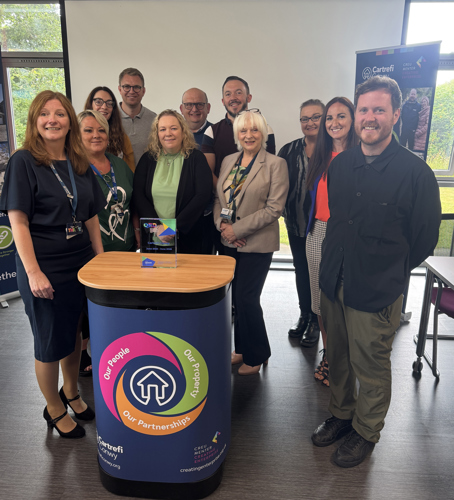Welsh Housing Awards 2025
Read all the shortlisted entries into this award category, excellence in championing equality and diversity, at the Welsh Housing Awards (WHA) 2025 and find out who won the award on the night.
This award recognises organisations leading on promoting equality and diversity within their businesses.
Winning project name
Gwent BOOST
Winning organisation
The Wallich
Partner organisations
Tai Pawb, Welsh Refugee Council, Coproduction Network for Wales, Cyfannol Womens Aid, St Giles Trust, Caerphilly County Council, Aneurin Bevan Health Board
Statement of support
Gwent BOOST: Levelling the playing field for diverse people in Gwent
Gwent BOOST is an ambitious five-year programme led by The Wallich in partnership with St. Giles, Cyfannol Women’s Aid, Tai Pawb, Co-production Network for Wales, Welsh Refugee Council, Caerphilly County Borough Council and Aneurin Bevan University Health Board. Together, these organisations are working to make homelessness in Gwent rare, brief, and non-recurrent. At its heart, the programme champions equality and diversity by placing people with lived experience at the centre of service design, delivery and leadership.

The programme was established with almost £3 million in lottery investment to test new approaches to homelessness prevention, with equality as a guiding principle. It works with people who often face the greatest disadvantage: women experiencing domestic abuse, refugees and people seeking asylum, individuals with No Recourse to Public Funds, and people living with complex trauma. These groups are disproportionately excluded from traditional housing and employment opportunities. BOOST addresses this imbalance by embedding trauma-informed care, tackling discrimination in the private rented sector, and opening pathways to education, training, and meaningful work.
In year two, BOOST reached over 320 people, providing tailored support that recognises the intersecting barriers of gender, race, migration status, and disability. For example, the Peer Advisor Programme supported women who had survived abuse to gain qualifications, placements and volunteering opportunities, building their confidence and sense of belonging. The Welsh Refugee Council facilitated volunteering placements with the NHS, Red Cross and schools, enabling people with insecure status to develop skills and move into paid work. Each strand demonstrates that diversity is not a barrier but a strength to be harnessed.
Equality has also been championed through the Champions Network, coordinated by Tai Pawb. This initiative brings together landlords, letting agents and tenants to challenge prejudice in the private rented sector. Over 40 landlords have taken part in training on equality and diversity, while tenant champions have co-designed workshops and even contributed evidence directly to Welsh government inquiries. This is a rare example of tenants with lived experience influencing policy and changing how landlords think about inclusion.
The programme has made equality visible through its Imagineers panel – a diverse group of people with lived experience who shape decisions across BOOST. Imagineers have co-written job descriptions to make them more accessible, co-chaired interviews, and represented Gwent in national discussions with the Royal Foundation. Their voices are respected by partner organisations, and their insights are shifting practice far beyond BOOST itself.

BOOST has also embedded psychological support for people excluded from mainstream services. Drop-in sessions in hostels and on the streets have reached individuals who were written off as “too hard to engage.” Many are now in stable accommodation. Staff and volunteers have been trained in trauma-informed approaches, reducing stigma and helping services respond with empathy rather than exclusion. This has created safer, more inclusive environments across Gwent.
The partnership model is itself a demonstration of diversity in action. Housing specialists, health professionals, equalities advocates and community organisations have learned from one another, shared resources, and built capacity across the system. Over 200 external organisations have been engaged in year two, from local authorities to grassroots groups, extending the reach of equality principles into mainstream practice.
The impact is already clear. Beneficiaries report increased confidence, stronger voices, and greater hope for the future. Staff describe their work as deeply rewarding, with one practitioner stating, “I’ve seen people flourish in ways they never imagined possible.” Organisations involved say BOOST has changed the way they work, encouraging more inclusive practices and expanding their reach into communities they had not previously served.
Gwent BOOST demonstrates that ending homelessness cannot be separated from addressing inequality and discrimination. By tackling prejudice in the housing system, opening opportunities for marginalised groups, and amplifying diverse voices, the programme is levelling the playing field in Gwent. Its legacy will be a stronger, more inclusive system where people are not only housed but valued and empowered.
Outcomes and achievements
In just two years, Gwent BOOST has transformed how equality and diversity are championed in homelessness services across Gwent. The programme has directly engaged over 320 people, including women facing multiple disadvantages, refugees, people with No Recourse to Public Funds, and individuals with complex trauma.
The Peer Advisor Programme has enabled women and refugees to secure qualifications, placements and volunteering roles, with some moving into employment. Volunteers report increased confidence, new skills, and a stronger sense of belonging. The Champions Network has trained more than 40 landlords and empowered tenants to challenge discrimination, including through direct contributions to Welsh government consultations.
The Imagineers panel of people with lived experience has become a recognised voice in local and national decision-making, influencing recruitment processes, service design and national campaigns. Their work demonstrates the power of co-production in creating inclusive services.
Psychological support has reached people excluded from mainstream services, with drop-ins enabling rough sleepers to move into safe accommodation. Staff across services now feel more able to deliver trauma-informed, person-centred support.
With over 200 partnerships formed, BOOST is embedding equality principles across housing, health and community services, demonstrating tangible progress towards making homelessness rare, brief and non-recurrent in Gwent.
Shortlisted entries
Valleys to Coast - Driving Meaningful Change Through Inclusion
Application entry
- Project name: Driving Meaningful Change Through Inclusion
- Lead organisation: Valleys to Coast
Statement of support
At Valleys to Coast, equality, diversity, and inclusion (EDI) are central to how we operate. Inclusion is not simply a policy or initiative; it is embedded across every aspect of our organisation, from our internal culture and policies to communications, service delivery, and community engagement.

Our approach is guided by a simple but powerful question: “Whose voice is missing?” This ensures that multiple perspectives are actively considered, creating meaningful change for both colleagues and customers.
Valleys to Coast has implemented a range of initiatives that demonstrate a strong EDI culture and drive tangible outcomes.
The Equity, Diversity and Inclusion Forum brings colleagues from across the organisation together to discuss protected characteristics, share lived experiences, and develop actionable strategies. This forum offers collaboration, awareness, and accountability, ensuring EDI is prioritised at all levels.
Valleys to Coast actively participates in local Pride events, engaging with the LGBTQ+ community to gather feedback and inform inclusive practices. This initiative also raises funds for the Terrence Higgins Trust, highlighting the organisation’s commitment to inclusive health and wellbeing.
The Menopause & Perimenopause Café allows colleagues to openly discuss menopause and perimenopause, reducing isolation and promoting wellbeing. The sessions are now held quarterly, covering additional topics such as nutrition, hormone replacement therapy, and male allyship, ensuring broad engagement across the workforce.
British Sign Language and deaf awareness training and interactive sessions have been delivered to over 85 colleagues, and Valleys to Coast is developing a partnership with Bridgend Deaf Club to expand accessibility and inclusion.
Their ‘Repairs and Maintenance for All’ initiative actively consults customers with protected characteristics, using their feedback to implement service improvements. Adjustments include flexible appointment scheduling, accessibility markers for trade colleagues, and culturally sensitive practices, ensuring services are inclusive and responsive.
Valleys to Coast encourages colleagues to engage with the Welsh language through internal campaigns, chat groups, and cultural celebrations such as St David’s Day, supporting cultural inclusion and identity.
The creation of Y Cwtch, a wellbeing and inclusive space for quiet space for prayer, reflection, breastfeeding, or mental health breaks, provides colleagues with an environment that supports diverse needs and promotes wellbeing.
An EDI data door-knocking campaign increased customer EDI data completeness from 48 per cent to 71 per cent, enabling more tailored and inclusive services.
Importantly, Valleys to Coast is working towards Tai Pawb’s QED Award. We are proud to have received the first-level assessment feedback, and it’s brilliant news: 53 examples of good practice were recognised, the most seen in any housing association so far, a milestone we are incredibly proud of.
Through these initiatives, Valleys to Coast ensures that inclusion is embedded in its organisational DNA. By engaging colleagues, customers, and partners, we’re creating a culture where every individual feels respected, heard, and empowered.
Outcomes and achievements
Valleys to Coast’s EDI initiatives have delivered significant, measurable impact.
Colleagues actively participate in forums, initiatives, and campaigns, embedding inclusive practices across departments. EDI has moved from a back-office consideration to a central organisational value, influencing daily interactions and decision-making.
Customers with protected characteristics are consulted on services, and their feedback directly informs improvements. This approach builds trust, strengthens relationships, and ensures services meet diverse needs.
The organisation’s work has been acknowledged by partners such as Bridgend Equality Council and showcased at Tai Pawb’s “Rising Above” EDI conference, reinforcing Valleys to Coast’s role as a sector leader in EDI. Progress towards the QED Award further demonstrates our commitment, with 53 examples of good practice recognised, the most of any housing association so far.
Initiatives such as Y Cwtch, menopause cafés, accessibility markers in services, and culturally sensitive practices have created welcoming environments for colleagues and customers alike.
By incorporating national awareness events, including Carers Week, Men’s Health Week, and Ramadan, Valleys to Coast ensures that inclusion is visible, meaningful, and embedded throughout the organisation.
Through strategic leadership, collaboration, and measurable actions, Valleys to Coast continues to build an inclusive, equitable environment, benefiting colleagues, customers, and the wider community.
Cartrefi Conwy - EmpowerED
Application entry
- Project name: EmpowerED
- Lead organisation: Cartrefi Conwy
Statement of support
Group Cartrefi Conwy is committed to creating and maintaining an environment and culture where everyone feels valued, respected, and supported. A strong ethos of promoting and raising awareness of equality, diversity, and inclusion is at the heart of how Cartrefi Conwy collaborates with colleagues, tenants, and communities.

One of the most significant steps taken to strengthen our commitment to driving positive, meaningful change and building a truly inclusive community has been working in partnership with Tai Paw. This resulted in achieving the prestigious QED Award – a recognised quality mark for the Welsh housing sector. This journey involved Tai Pawb undertaking a comprehensive assessment of our approach, enabling us to understand our organisational strengths and identify further opportunities for improvement. Tai Pawb provided a detailed action plan with 62 actions for Cartrefi Conwy to deliver, covering five key areas: strategic approach, service delivery, service access, meaningful involvement, and organisation culture.
Colleagues across all teams were invited to contribute evidence, share their experiences, and suggest improvements. This collaborative approach ensured that change was meaningful and reflected the needs of the people it affects most.
A dedicated QED project group was established to lead this important work. Seventeen of the actions specifically focused on creating an inclusive workplace where equality, diversity, and inclusion are actively promoted and embedded in the culture. This included reviewing policies, improving processes, and listening to the lived experiences of colleagues and tenants from diverse backgrounds, ensuring that inclusive decision-making is driven by data. The remaining forty-five actions covered governance, services, access, and involvement, resulting in many impactful changes, including:
- Embedding our approach to equality diversity and inclusion within the development of our new co-produced 2025 to 2028 Corporate Plan.
- Reshaping Cartrefi Conwy procurement policy and processes to align with our EDI commitments.
- Ensuring our approach is reflected and central to our Cartrefi Conwy Customer Promise.
The group also took steps to raise awareness and increase engagement at all levels of the business. Regular communications, leadership updates, and opportunities for colleagues to get involved in decision-influencing activities have fostered a sense of shared responsibility for equality, diversity, and inclusion.
Through the QED project, Cartrefi Conwy not only prioritised meeting recommendations set by Tai Pawb but also used this as a catalyst to embed a lasting culture of inclusivity. This meant creating a workplace where differences are celebrated, opportunities are fair, and barriers are actively removed. Of the 62 recommended actions from Tai Pawb, 60 were completed by the point of final submission, with the remaining two in progress. The QED panel unanimously awarded the accreditation to Group Cartrefi Conwy for its commitment, dedication, and efforts.
This achievement of the QED award is a testament to our ongoing journey towards equality, diversity, and inclusion, and we remain dedicated to building on this foundation for the benefit of our colleagues, tenants, and the wider community. The actions being taken now will not only meet the standard but will help to shape a more inclusive organisation for years to come – one that truly reflects and supports the diverse communities it serves.
Outcomes and achievements
Group Cartrefi Conwy has made significant progress in advancing equality, diversity, and inclusion (EDI), working closely with Tai Pawb to achieve the Quality in Equality and Diversity (QED) Award, a recognised benchmark in the Welsh housing sector. Through this collaboration, we reviewed our strategic approach, service delivery, accessibility, tenant involvement, and organisational culture, resulting in a detailed action plan with 62 recommendations.
Key outcomes include embedding EDI principles in the 2025-2028 co-produced Corporate Plan, reshaping procurement policies to reflect EDI commitments, and integrating EDI into the Customer Promise, providing tenants with opportunities to influence recruitment and service decisions.
Since the project, colleague engagement has increased through regular updates, contributions to evidence, and open discussions on equality and diversity. The structured QED project group ensured progress and accountability in partnership with colleagues, service providers, and communities.
Cartrefi Conwy has successfully delivered 60 of the 62 actions, with the remaining two in progress. These initiatives are already fostering a fairer, more inclusive environment for tenants, customers, and colleagues. The work establishes a lasting legacy, embedding equality, diversity, and inclusion into every aspect of the organisation and the communities it serves.



